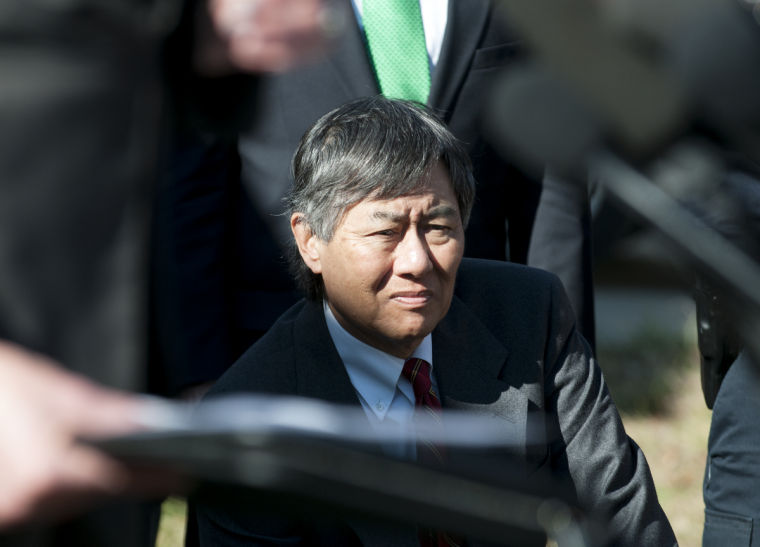Between extending hours at counseling centers and mobilizing on-campus safety plans, many university officials quickly changed their schedules after news broke of an off-campus murder-suicide that killed two students and injured one Tuesday morning.
While university and city officials have discussed expanding University Police’s jurisdiction to include more off-campus areas — including the 8700 block of 36th Ave., where the incident occurred — university President Wallace Loh said he hopes the shooting expedites the College Park City Council’s decision to station more officers on and around the campus. Additionally, officials are discussing safety plans and expanding mental health services on the campus to help students cope.
“If there’s a time to really move fast on expanding our police, it’s now,” Loh said. “We need, of course, city officials involved, and I hope this will galvanize that.”
Immediately following the shooting, University Police began “marshaling all of our resources to address this tragedy,” University Police spokesman Maj. Marc Limansky said.
The shooting followed a rash of armed robberies on and off the campus in the past three weeks, prompting University Police to increase patrols for footpaths along the edges of the campus. Police have made arrests in three of the recent reported or attempted armed robberies, including charging a female student for filing a false report.
However, the occurrence of a shooting so close to the campus prompted police to reaffirm their preparedness if a similar incident were to happen on campus grounds. While University Police haven’t made concrete changes, officials are confident their current methods of planning and training can protect students in crisis, Limansky said.
“It’s a sad, sad day,” he said, “but we continue to train and look for better ways to do things.”
But the murder-suicide also highlights another pressing issue that has made national headlines: mental health disorders. Prince George’s County Police discovered that the shooter, graduate student Dayvon Maurice Green, suffered from a mental illness for at least a year.
“We do need a period of mourning and recovery, and I’m sure the campus will be reviewing all of the support structures it has in place and thinking about what we can do to try to avoid events like this in the future,” said Brit Kirwan, University System of Maryland chancellor. “It’s a reminder that we all have to do everything we can to be evermore sensitive to individuals who are under some kind of stress and try to get help for them as quickly as we can.”
The shift in priority has also spread to the University Senate, which may turn its attention to general safety at the body’s Campus Affairs Committee meeting Friday, members said. The committee is always charged with putting together a safety forum for the spring semester, typically choosing specific focuses such as pedestrian, bike and scooter safety.
“It may be that we’re just going to have to really look at personal safety issues and how can students protect themselves on campus,” said Marcy Marinelli, committee chairwoman. “It’s horrible. It’s like the worst thing that you can imagine happening on a college campus.”
Officials said they also recognize the need to help students cope emotionally with the jarring incident. Mental health service providers on the campus are encouraging people in need of emergency counseling to take advantage of offices’ flexibility over the next few days. Students can meet with a member of the University Counseling Center without an appointment, Monday through Thursday from 8:30 a.m. to 9 p.m. and Fridays until 4:30 p.m., said Director Sharon Kirkland-Gordon.
The Help Center — a peer counseling service that offers a crisis intervention hotline and walk-in counseling — is expanding its hours this week. The center will open early at 9 a.m. rather than 2 p.m.
“No matter what you are feeling, if you’re feeling sad, angry or scared, it’s all OK,” said Madison Higgins, the Help Center’s administrator. “Remember it’s important to reach out if you’re feeling overwhelmed in any way.”
The health center, meanwhile, has been proposing increased funding to supplement its staff, including adding another psychiatric nurse practitioner. Demand is high for more staff members who can prescribe medicine to help students manage mental illness, said Marta Hopkinson, mental health director.
The center is also trying to improve its outreach methods for suicide prevention. That could mean adding more staff in that area, or, in a move reinforced by the mass shooting at Sandy Hook Elementary School, develop a program to serve students with Autism spectrum disorders.
But right now, the university’s primary focus is mourning the loss of its students, Loh said, leading officials to cancel a celebration of the Lunar New Year that was scheduled for tonight at the president’s residence. Even though the annual event typically attracts 400-500 people, including regents and high-profile state officials, the university spent yesterday contacting people to inform them it was canceled “because it’s not appropriate,” Loh said.
“I ask that the entire University family come together to deal with this great loss,” Loh wrote in an email to the university. “Ours is a university of great resolve. Together, we will emerge from our collective sadness.”
University President Wallace Loh at a press conference about the murder suicide committed by Dayvon Maurice Green.
David Mitchell, University of Maryland Police chief, speaks to reporters the day of the Feb. 12, 2013, off-campus murder-suicide.





